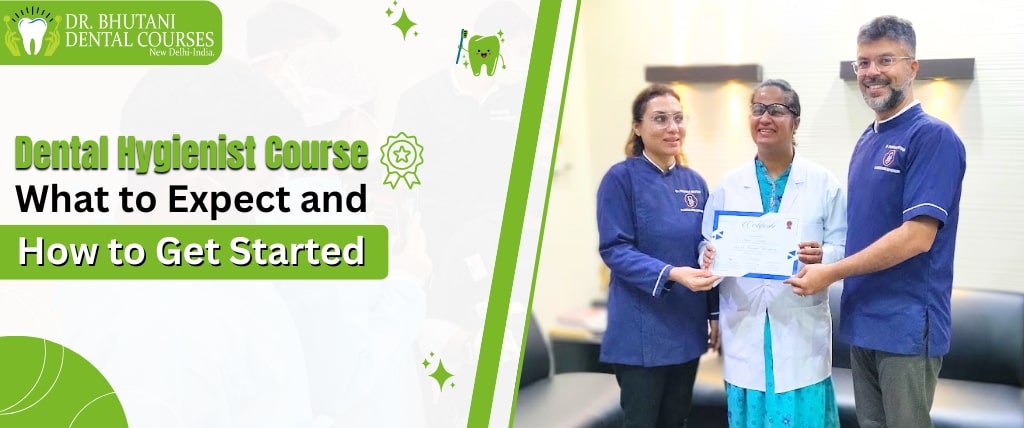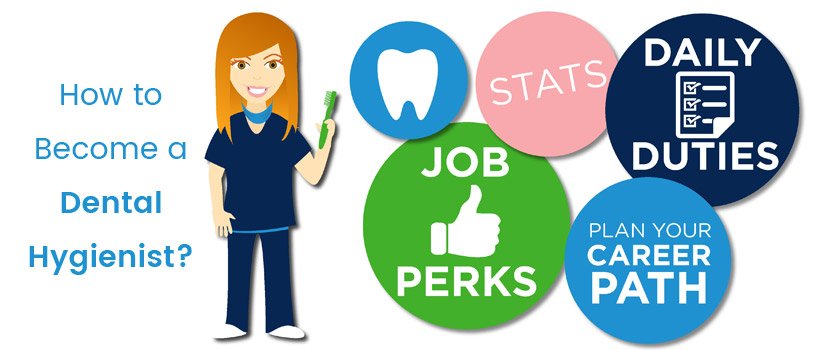A gratifying career option, dental hygienists play a crucial part in preserving oral health in addition to providing a combination of clinical work and patient connection. If you’re thinking about enrolling in a dental hygienist program, you may be curious about what to expect, what to study, and how to get started. Everything you need to know about a dental hygienist school, including the curriculum, potential career paths, and how to start along the route toward this fascinating vocation, will be covered in this blog.
What is a Dental Hygienist?
Certified healthcare professionals, dental hygienists play a crucial role in supporting dentists by promoting proper oral hygiene practices among patients. Through a dental hygienist course, they are trained to perform teeth cleanings, apply fluoride treatments, and administer sealants as preventive measures. Additionally, they assist with more complex dental procedures and provide valuable patient education on maintaining optimal oral health. Their expertise is essential in preventing oral diseases and helping patients maintain healthy, beautiful smiles.
Why Pursue a Dental Hygienist Course?
- Growing Demand: As more individuals realize how important oral hygiene is, the dentistry field is growing. Dental hygienists are in great demand across the world, where they may expect steady employment and excellent pay.
- A fulfilling career: Dental hygienists assist patients in maintaining improved oral health, frequently changing lives by avoiding illnesses and boosting self-esteem via whiter teeth.
- Flexible Work Options: Depending on their preferences, dental hygienists can work either part-time or full-time hours. Some even have positions in several public health, educational, or dental facilities.
- Career Advancement: There is potential for advancement in the dental hygienist field. Hygienists have the option to pursue careers in teaching or administration, pediatric dentistry, periodontics, or other fields by continuing their study.
What to Expect from a Dental Hygienist Course
Depending on the school, the majority of dental hygienist programs span two to three years and lead to either an associate degree or a certificate. In addition, some schools grant bachelor’s degrees to individuals who need more extensive instruction. Let’s examine the main elements of the course in more detail:
1. Core Curriculum
- Dental Anatomy and Physiology: The anatomy and physiology of teeth, gums, and surrounding tissues are covered in the course Dental Anatomy and Physiology. Recognizing problems during dental checkups requires an understanding of oral anatomy.
- Oral Pathology: Students acquire the ability to identify symptoms of common oral conditions such as cavities, gum disease, and oral cancer. This information is essential for evaluating patients and making referrals.
- Periodontology: One of the most frequent problems dental hygienists deal with is gum disease, and this subject concentrates on its prevention, diagnosis, and treatment.
- Radiography: Dental hygienists need to know how to take and interpret X-rays. Students who enroll in radiography courses learn how to use X-ray equipment properly and analyze the results.
- Dental Hygiene Practice:The program’s major course, Dental Hygiene Practice, teaches students how to clean teeth, administer sealants and fluoride, and counsel patients on maintaining good oral hygiene. Clinical environments are where practical instruction is frequently conducted.
- Infection Control: Preventing the transmission of infections in dental offices requires maintaining a sterile atmosphere. The best ways to sanitize equipment and uphold cleanliness in clinical settings are taught to students.
2. Practical Experience
An essential component of every dental hygienist school is practical practice. Clinical rotations are a feature of most programs, allowing students to work directly with patients while being supervised by more seasoned dental professionals. Students are more prepared for their responsibilities in dental clinics following graduation because to these practical experiences.
3. Communication Skills and Patient Education
Dental hygienists devote a large amount of their time to teaching patients proper oral hygiene practices. Effective communication and patient empathy are two critical skills that are cultivated during the training. Pupils will acquire the ability to customize their recommendations for diverse age groups. This includes instructing young patients on appropriate brushing habits and senior citizens on how to take care of their dentures.
4. Preparation for Licensure Exams
In order to work as dental hygienists, students must pass licensing examinations after finishing their training. Usually, the licensing procedure involves both written and practical tests. Courses provide the theoretical knowledge and practical abilities needed to satisfy state or national license standards, as well as test preparation.
How to Get Started in a Dental Hygienist Course
Now that you have a good idea of what to expect from a dental hygienist course, here’s how you can begin your journey:
1. Research the Requirements
The criteria to become a dental hygienist differ between states and nations. Generally speaking, to apply to a dental hygienist program, you must have at least a high school degree or its equivalent. Additionally, requirements in areas like biology, chemistry, or anatomy may be required by some universities. Make sure you review the particular prerequisites for the programs you are considering.
2. Choose an Accredited Program
Selecting a dental hygienist program that is approved by the national dentistry or educational bodies is crucial. The program’s compliance with requirements and the recognition of your qualifications by licensing authorities and prospective employers are guaranteed by accreditation.
3. Apply to Dental Hygienist Programs
The next step is to apply to the program that you have selected based on your needs. Transcripts of your academic work, recommendation letters, and even a personal essay outlining your motivation for pursuing a career in dental hygiene are usually required for this. Remember to adhere to application deadlines and make sure you fulfill all prerequisites.
4. Secure Financial Aid
Financial aid is a lifeline for many students who need assistance paying for their education. Make sure you look into funding possibilities for your dental hygienist education, such as grants, scholarships, and student loans. Additionally, some schools could include work-study options so you can get experience while paying for your tuition.
5. Prepare for the Program
Programs for dental hygienists can be rigorous, so it’s critical to be ready before enrolling. Revisit your science background, especially in areas such as biology and anatomy, to provide a solid academic basis.
Career Opportunities After Completing the Course
After completing a dental hygienist course and obtaining your license, you’ll have various career opportunities available:
- Dental clinics: The majority of dental hygienists support dentists in private practices by helping with normal dental cleanings and patient care.
- Public health: A few dental hygienists practice in community health settings, where they treat underprivileged patients and spread awareness of the need of good oral hygiene.
- Education: Dental hygienists that complete further coursework may choose to work in academic institutions, instruct future hygienists, or seek professions in teaching.
- Specialty Practices:Dental hygienists may find employment in speciality fields such as periodontics, orthodontics, or pediatric dentistry.
Conclusion
A dental hygienist course provides students with the essential skills and knowledge to thrive in the growing healthcare field. Combining hands-on experience, classroom learning, and clinical training, it prepares you for a rewarding career in helping patients maintain their oral health. Similarly, a dental assistant course focuses on equipping students with the expertise to assist dentists during procedures and patient care. If you are passionate about healthcare, enjoy working with people, and seek a flexible career with growth opportunities, explore accredited programs, prepare for admission, and start your journey toward a meaningful profession today.



